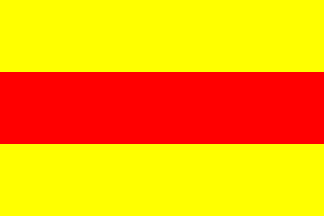![[Provincial flag of South Holland]](../images/n/nl-zh.gif) image
by Gerard van der Vaart, 11 February 1996
image
by Gerard van der Vaart, 11 February 1996

Last modified: 2025-03-08 by rob raeside
Keywords: zuid-holland | lion |
Links: FOTW homepage |
search |
disclaimer and copyright |
write us |
mirrors
![[Provincial flag of South Holland]](../images/n/nl-zh.gif) image
by Gerard van der Vaart, 11 February 1996
image
by Gerard van der Vaart, 11 February 1996
On 22 June 1948 the flag of Zuid-holland was established as three horizontal
stripes YRY. On 24 Oct 1985 the Province decided to change the flag into
a yellow field with a red rampant lion. That is: the old flag of the Counts
of Holland was restored, which according to tradition had been in use since
the time of the Crusades. The lion was suppose to symbolize the "always
victorious lion of Judah". The present flag is official since 1 Jan 1986.
From: "De Nederlandse vlag in heden en verleden", by Derkwillem
Visser, 1990.
Jarig Bakker, 18 Apr 2003
 by Mark Sensen, 19 Apr 2003
by Mark Sensen, 19 Apr 2003
I noticed that the twocolored triband from 1948 is missing. I'm pretty
sure I posted it May 1999 with the other provincial flags..
Mark Sensen, 19 Apr 2003
.gif) International Civic Arms : http://www.ngw.nl/heraldrywiki/index.php?title=Zuid_Holland
International Civic Arms : http://www.ngw.nl/heraldrywiki/index.php?title=Zuid_Holland
"Or, a lion rampant gules, armed and langued azure. The shield is crested by a coronet of four pearls between five leaves or. Supporters: two lions rampant gules, armed and langued azure. On a golden ribbon the motto VIGILATE DEO CONFIDENTES in red lettering."
The arms of Zuid-Holland are the original arms of the county of Holland.
The arms are known since the end of the 12th century. In the 14th century
the arms were quartered with the arms of the county of Henegouwen (Hainaut),
resulting in a shield with four lions (see f.e. Tholen, Beverwijk, Rotterdam
and Poortvliet, cities which were granted city rights in the 14th century).
Later the counts quartered the Holland-Henegouwen arms with Bavaria, as
the new family was a branch of the Wittelsbach family (who were kings of
Bavaria). These arms can be seen in the arms of Goes and Reimerswaal. Since
the 15th century only the original lion is the arms of Holland. The lion
was often placed in a so-called Garden of Holland, a fence surrounding
the shield. Not only the provincial government, but also many cities in
Holland used this symbol. Nowadays only Geertruidenberg and Gent (Belgium)
use the Garden of Holland. As both the counts of Holland as the provincial
government were quite influential, the lion of Holland is present in many
arms, f.e. in the arms of the provinces of Overijssel,
Utrecht and Zeeland.
The motto was introduced in the 16th century.
Info from Ralf Hartemink's site.
 by Jarig Bakker, 26 January 2001
by Jarig Bakker, 26 January 2001
In 1938 Queen Wilhelmina had reigned the Netherlands for 40 years. On
that occasion a lot of municipalities paraded in front of HM with their
flags, which consisted of the provincial flag with the municipal coat of arms in
the canton (or something...). Those municipal flags can only be considered
as 'curiosities', while the status of the provincial flags is not quite
clear.
Jarig Bakker, 26 January 2001